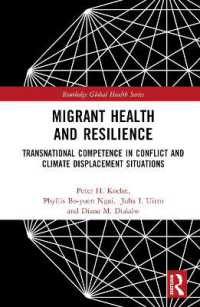- ホーム
- > 洋書
- > 英文書
- > Philosophy
Full Description
In Rawlsian Political Analysis: Rethinking the Microfoundations of Social Science, Paul Clements develops a new, morally grounded model of political and social analysis as a critique of and improvement on both neoclassical economics and rational choice theory. What if practical reason is based not only on interests and ideas of the good, as these theories have it, but also on principles and sentiments of right? The answer, Clements argues, requires a radical reorientation of social science from the idea of interests to the idea of social justice.
According to Clements, systematic weaknesses in neoclassical economics and rational choice theory are due to their limited model of choice. According to such theories in the utilitarian tradition, all our practical decisions aim to maximize the satisfaction of our interests. These neo-utilitarian approaches focus on how we promote our interests, but Clements argues, our ideas of right, cognitively represented in principles, contribute independently and no less fundamentally to our practical decisions.
The most significant challenge to utilitarianism in the last half century is found in John Rawls's Theory of Justice and Political Liberalism, in which Rawls builds on Kant's concept of practical reason. Clements extends Rawls's moral theory and his critique of utilitarianism by arguing for social analysis based on the Kantian and Rawlsian model of choice. To illustrate the explanatory power of his model, he presents three detailed case studies: a program analysis of the Grameen Bank of Bangladesh, a political economy analysis of the causes of poverty in the Indian state of Bihar, and a problem-based analysis of the ethics and politics of climate change. He concludes by exploring the broad implications of social analysis grounded in a concept of social justice.








